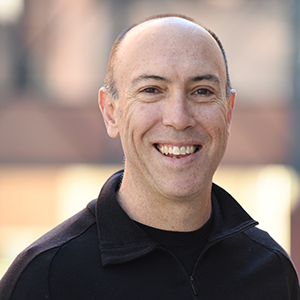
Lorimer Moseley presents: The Fit for Purpose model: the science, evidence and future possibilities for recovery from chronic pain
Intellectual House (wǝɫǝbʔaltxʷ) 4249 Little Canoe Channel NE Seattle, WA 98105
Join the Division of Physical Therapy on September 30 at noon for a special guest lecture by Professor Lorimer Moseley.
Location:
Intellectual House (wǝɫǝbʔaltxʷ)
4249 Little Canoe Channel NE
Seattle, WA 98105
Talk Abstract
Many current treatment approaches for people with chronic pain are repurposed from other conditions, where they have had variable success. However, discoveries around ‘how pain works’, how complex bodily systems learn and adapt, and how sensorimotor processing is disrupted in chronic pain, led to new treatments built ‘from the ground up’ that directly targeted those disruptions and ‘aim higher’ with respect to the possibility of recovery, rather than just ‘management'.
The Fit for Purpose model was developed to integrate the most effective of those treatments into a coherent complex care package, grounded in rethinking pain and its causes, refining neuroimmune networks (or ’neurotags’) and gradually reinstating functional and structural resilience. The model is centered around the concept of ‘bioplasticity’ and clinical trials testing the model against a range of comparators are in process, planned or completed.
In this talk I will cover the scientific underpinnings of the model, the current evidence around its effectiveness in a range of conditions, its failures and limitations, the powerful role that consumer feedback has played in adaptation, and the resources that have been developed to standardize and optimize implementation.
Learning objectives
1. To understand the foundational experiments that underpin the Fit for Purpose model of recovery from chronic pain.
2. To evaluate the evidence from clinical trials and real-world data concerning the impact of intervention based on the Fit for Purpose model.
3. To recognize the differential effects of the model according to primary diagnosis.
4. To reflect on the limitations of pain education components of care and their relevance to current clinical practice and licensure training.
5. To understand recent developments in pain education including consumer-guided content and contemporary learning models and strategies.
6. To feel the possibilities for transformative outcomes that may lie in future development of this field.
Presenter Biography

Professor Lorimer Moseley AO FAAHMS FACP FFPMANZCA(Hon)
Lorimer is Bradley Distinguished Professor at the University of South Australia. He is a clinical and research physiotherapist, Professor of Clinical Neurosciences, Foundation Chair in Physiotherapy and CEO of the non-profit Pain Revolution. He has authored 400 scientific articles and seven books, has made seminal contributions in both pain science and pain management, and won prizes from governments or professional societies in 13 countries.
He has delivered free public pain education events to over 30,000 people in six countries and his patient-facing videos attract over five million views annually. In 2020, he was made an Officer of the Order of Australia, Australia’s second highest civilian honor, for "distinguished service to the fields of pain and its management, education, science communication and physiotherapy, to humanity at large."
